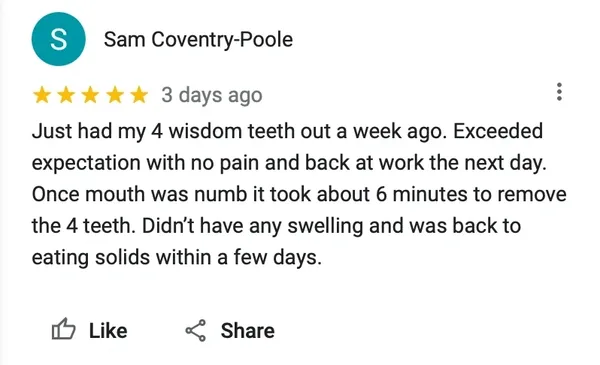Wisdom Teeth Removal & Treatment
Wisdom teeth removal signs and symptoms
Wisdom teeth have a funny way of becoming uncomfortable and painful at the worst times. Sometimes pain from your wisdom teeth can come and go over a few weeks or months or years.
Sometimes it is recurring gum pain and inflammation around wisdom teeth that can be uncomfortable.
Sometime wisdom teeth are removed before orthodontic treatment, poor hygiene, lack of space, cysts forming, food trapping, infection or not enough room for them to grow through.
Why choose Belleview Dental for wisdom teeth removal?
- You will go undergo the procedure in a calming and inviting environment at our clinic.
- The procedure will be performed by an experienced dental surgeon with over 20 of years experience.
- Our dental surgeon has removed wisdom teeth for over 12,000 patients and counting.
- Our dental surgeon has published scientific articles for the Australian Dental Research Foundation as well as other scientific bodies.
- Our dental surgeon maintains several dental affiliations and has a special interest in oral surgery, including wisdom teeth removal, bone grafting and implant surgery.
- He also has a mentoring role in the area of implant replacement, and has been placing implants for over ten years in private practices in inner city Melbourne.
- You’ll love him!
What does the wisdom teeth removal procedure involve?
- Initial consultation with one of our Dental practitioners to assess your case.
- We take x-ray radiographs to assess the position of your wisdom teeth.
- We create a treatment plan to remove your wisdom teeth at Belleview Dental depending on the complexity of your individual case.
- We arrange an appointment for wisdom teeth removal with our dental surgeon.
- You undergo the wisdom teeth removal procedure.
- You go home and recover. For most cases, recovery can be as little as 1 day. Each individual case is different, more complex cases can be a a few days.
Reasons why you need wisdom teeth removed
1. Lack of space
Wisdom teeth are the last set of molars to come in, usually in your late teens or early twenties. Sometimes, there isn’t enough space in your mouth to accommodate them properly. This can lead to the wisdom teeth becoming impacted, which means they get stuck in your gums or jawbone. Impacted wisdom teeth can cause pain, swelling, and infection.
2. Crowding and misalignment
Even if your wisdom teeth manage to come in partially or fully, they can cause crowding and misalignment in your mouth. They may push against your existing teeth, shifting them out of their proper position. This can affect your bite and the alignment of your smile.
3. Difficulty in cleaning
Wisdom teeth are located at the back of your mouth, making them difficult to clean properly. Their position makes it hard to reach them with a toothbrush or floss, increasing the risk of decay, cavities, and gum disease. Removing them can improve your oral hygiene and reduce the chances of future dental problems or infections.
4. Infections and cysts
When wisdom teeth don’t fully emerge from the gums, they create a small opening or flap of gum where bacteria and food particles can accumulate. This can lead to infections, causing pain, swelling, and bad breath. In some cases, cysts or fluid-filled sacs can develop around the impacted teeth, which can damage the surrounding bone and nerves.
5. Jaw pain and headaches
Impacted wisdom teeth can exert pressure on the surrounding structures, including your jawbone, nerves, and sinuses. This pressure can result in jaw pain, headaches, and even earaches. Removing the wisdom teeth can alleviate these discomforts and improve your overall oral health.
Special offer
Get a FREE wisdom teeth consultation when you book in with Belleview Dental for a dental check-up and clean, this includes a full mouth X-ray free of charge.
How much does it cost to remove wisdom teeth?
The cost of wisdom teeth removal can vary, depending on your treatment plan. However, below are some of the costs that may be included.
1. Insurance cover
Check with your insurance company if you have Major dental as part of your policy. Staff at Belleview Dental will be more than happy to help you work this out.
2. Consultation & x-ray cost
Otherwise, a wisdom teeth consultation on its own is $50.
3. Wisdom teeth extraction
If you have health insurance they may cover a portion of the treatment.
4. Gas sedation
5. Anaesthetic
General Anaesthetic: The total cost of General Anaesthetic is $1,400. This includes all associated costs related to general anaesthetic during your appointment for wisdom teeth removal.
Benefits of wisdom teeth removal under Local Anaesthesia
Although wisdom tooth surgery is not something which people look forward to, modern surgical and anaesthetic techniques have now combined to make such surgery a far more acceptable experience than in the past.
1. Less invasive
Local anaesthetic numbs the specific area being treated, allowing you to remain awake during the procedure. It is generally less invasive than general anaesthesia.
2. Faster recovery
Since you are not fully sedated, the recovery time is usually quicker compared to general anaesthesia.
3. Cost effective
Local anaesthesia is often less expensive than general anaesthesia, as it doesn’t require additional anaesthesia specialists or equipment.
4. Avoid potential side effects of general anaesthesia
General anaesthesia can lead to side effects such as nausea, vomiting, or a sore throat. These effects can cause discomfort and may prolong the recovery process. Opting for local anaesthesia can help minimise the occurrence of these side effects, leading to a smoother and more comfortable recovery.
5. Personal preference and control
What happens after my wisdom teeth removal?
Post wisdom teeth removal care
Great, you’ve had your wisdom teeth out! Now what? What should you do?
- Avoid unnecessary physical activity.
- It is extremely important not to spit out or rinse in the first 24 hours.
- Avoid alcohol and smoking for 2-3 days afterwards, it prolongs healing and can lead to infection.
- To prevent bleeding, do not have any HOT food or HOT liquids for 24 hours. Luke warm or cold is recommended.
- Start a soft diet as soon as possible, eat small amounts 5-6 times a day.
- 24 hours after treatment very gently rinse with lukewarm salt and water every six hours and continue twice daily until the wound heals. Don’t swish the water out – let the water drop out of the mouth.
- Tooth brushing may be resumed as soon as possible avoiding the area for 24 hours.

Get a treatment plan for your wisdom teeth

Drop in at our clinic or click the link below to set up an appointment with our dental team.






